Cockatiels and Cockatoos are prone to hissing, all ours hiss at me daily.
Unfoutunately parrots are not like dogs, they require a lot of patience, time and little baby steps to tame and train them.
With all new birds, I would give them 24 hours to settle first, I would not even go into the same room as them or go near the cage except for food, water and changing the paper lining on the bottom of the cage (even better, place 7 layers of paper on the bottom of the cage and remove one daily)
After the first 24 hours, then just sit in the same room as them but ignore them.
After they get used to you being in the same room, then you can start verbally interacting with them by talking and singing to them.
If you are feeling brave and confidence in getting them back into the cage , I would provide them with a perch stand out side their cage and allow them out. When they feel comfortable, they will come over to you on their own accord. If you do let them out, make sure that the room is bird safe (they like to chew things) as well as escape proof (keep windows and doors closed at all times) and never leave them alone unattended if you do let them out. But don't let them out if you are not confidence in getting them back into the cage without chasing them or stressing them, they are quick flyers.
Also ensure that any other pets in the household don't have access to your birds.
Avoid eye contact with your birds and never put your hand in their cage (except for food, water change and cleaning), respect this as their territory and safe place.
If you are not confidence in letting them out of the cage, I would place a small perch on the front door (you can get bolt on ones with a wing nut) and attach it in such a way that you can still open the door (hence why a small perch). This will become your training perch for clicker training, you can do this through the bars without opening the door or letting your birds out. As you progress, you can train you bird to sit on the perch once the door is open and this will be the step up perch to bring you bird in and our of the cage.
Remember the key here is little baby steps and a lot of patience, taming can take weeks, years or may never happen. Not all our birds that we own here are tame, others have taken years to build up trust
 i purchased 2 cockatiels yesterday, not 100% sure on sex however im thinking male and female. 2 years 8 months old. One of my cockatiels is very very aggressive. If you go anywhere near the cage it hisses and sort of like shows its going to attack. The other however doesnt seem botherd as it nips at peices of apple you slot in the cage bars. Anyone els had this problem? Im hoping to tame however i know this is going to take very slow steps and quite abit of time. The previous owner said she hadnt handled them for 6 months
i purchased 2 cockatiels yesterday, not 100% sure on sex however im thinking male and female. 2 years 8 months old. One of my cockatiels is very very aggressive. If you go anywhere near the cage it hisses and sort of like shows its going to attack. The other however doesnt seem botherd as it nips at peices of apple you slot in the cage bars. Anyone els had this problem? Im hoping to tame however i know this is going to take very slow steps and quite abit of time. The previous owner said she hadnt handled them for 6 months  or even been let out the cage !!! So im unsure again if even the previous owner before her had even handled them. Whats the chances im ever going to be able to tame them slowly. Thanks
or even been let out the cage !!! So im unsure again if even the previous owner before her had even handled them. Whats the chances im ever going to be able to tame them slowly. Thanks 


 Congrats on your two new beauties! You've already been given some good advice.
Congrats on your two new beauties! You've already been given some good advice.